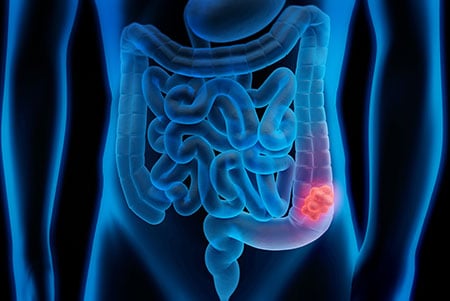Can Colorectal Cancer Be Prevented?
According to the World Health Organization (WHO), colorectal cancer is the third most common type of cancer worldwide, accounting for approximately 10% of all cases. It predominantly affects older individuals and is usually diagnosed after age 50. However, a growing number of cases are being diagnosed in younger adults.
Another important fact about colorectal cancer is that its incidence and impact can be significantly reduced with certain preventive measures, such as:
Routine screenings
 Colorectal cancer almost always develops from abnormal growths (polyps) in the colon or rectum. In addition to detecting benign polyps so they can be removed before they progress and become cancerous, screening tests can also detect colorectal cancer in an early stage when more treatment options are generally available.
Colorectal cancer almost always develops from abnormal growths (polyps) in the colon or rectum. In addition to detecting benign polyps so they can be removed before they progress and become cancerous, screening tests can also detect colorectal cancer in an early stage when more treatment options are generally available.
Some tests that can be used to screen for colorectal cancer include:
- Colonoscopy - Regular colonoscopy screenings are one of the most effective ways to prevent colorectal cancer. During a colonoscopy, a physician can identify and remove polyps and other abnormal tissues. The American Cancer Society recommends periodic colonoscopies for average-risk adults starting around age 50.
- Fecal occult blood test (FOBT) and fecal immunochemical test (FIT) - These non-invasive tests can detect blood in the stool, which can be a sign of colorectal cancer that warrants follow-up testing, such as a colonoscopy.
- Flexible sigmoidoscopy - This screening test is similar to a colonoscopy but only examines the lower part of the colon. Sigmoidoscopy can help detect polyps and tumors in the rectum and sigmoid colon.
- CT colonography - Also known as a virtual colonoscopy, this imaging test uses computed tomography (CT) to produce detailed images of the interior of the colon and rectum. CT colonography may be a good option for a patient who cannot have a traditional colonoscopy.
A healthy lifestyle
Through extensive research, scientists have linked several controllable lifestyle practices with colorectal cancer. By adopting and maintaining some positive habits, it may be possible to reduce the risk of colorectal cancer as well as some other potentially serious conditions, including diabetes, cardiovascular disease and other types of cancer. These include:
- Ensuring proper nutrition - Consuming a diet rich in fruits, vegetables, whole grains and high-fiber foods and low in red and processed meats can help reduce colorectal cancer risk.
- Exercising regularly - Engaging in low-impact physical activity, such as brisk walking, cycling or swimming, can help ward off colorectal cancer. Many experts recommend getting at least 150 minutes of moderate-intensity exercise per week.
- Achieving and maintaining a healthy body weight - Being overweight or obese is a known risk factor for colorectal cancer. The most effective weight-loss strategy is a combination of diet and exercise, which can further reduce the risk of cancer.
- Abstaining from or limiting alcohol consumption - Excessive consumption of alcoholic beverages is an established risk factor for colorectal cancer.
- Avoiding tobacco - Smoking and other forms of tobacco use directly increase the risk of cancer, and quitting can significantly reduce that risk.
Genetic testing and counseling
Approximately 5% of people who develop colorectal cancer have an inherited gene mutation associated with a family cancer syndrome. The most common inherited syndromes linked to colorectal cancer are Lynch syndrome, which is also known as hereditary non-polyposis colorectal cancer (HNPCC), and familial adenomatous polyposis (FAP).
Genetic testing and counseling can help identify individuals who are at heightened risk for developing colorectal cancer and provide important information for physicians to consider when recommending appropriate screening schedules.
Human papillomavirus (HPV) vaccination
The HPV vaccine is recommended for preventing certain types of HPV infections, including the high-risk strains that can lead to anal cancer, a type of colorectal cancer. Typically, the vaccine is given to adolescents, but it can also be administered to young adults. Through recent studies, researchers have found evidence that HPV vaccination is reducing the incidence of anal cancer among young adults in the United States.
Aspirin therapy
Some studies suggest that the regular use of low-dose aspirin (81mg per day) may reduce the risk of colorectal cancer, particularly in individuals who have a family history of colorectal cancer. However, the decision to use aspirin for preventive purposes should be made with the guidance of a physician who can explain the potential benefits, risks and side effects.
Benefit from world-class care at Moffitt Cancer Center
With the right preventive strategy and early detection, the risk of colorectal cancer can be greatly reduced. If you would like to explore your risk profile with a specialist in Moffitt’s acclaimed Gastrointestinal Oncology Program, you can request an appointment by calling 1-888-663-3488 or submitting a new patient registration form online. You do not need a referral.

